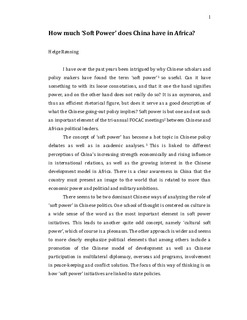How much ‘Soft Power’ does China have in Africa?
Chapter
Permanent lenke
http://hdl.handle.net/11250/2490358Utgivelsesdato
2016-01-01Metadata
Vis full innførselSamlinger
- Publications [1488]
Originalversjon
in Zhang, Xiaoling, Wasserman, Henry, Mano, Winston : China's media and soft power in Africa: Promotion and perceptions. Palgrave Macmillan pp. 65-78 10.1057/9781137539670Sammendrag
I have over the past years been intrigued by why Chinese scholars and policy makers have found the term ‘soft power’1 so useful. Can it have something to with its loose connotations, and that it one the hand signifies power, and on the other hand does not really do so? It is an oxymoron, and thus an efficient rhetorical figure, but does it serve as a good description of what the Chinese going-out policy implies? Soft power is but one and not such an important element of the tri-annual FOCAC meetings2 between Chinese and African political leaders. The concept of ‘soft power’ has become a hot topic in Chinese policy debates as well as in academic analyses. This is linked to different perceptions of China’s increasing strength economically and rising influence in international relations, as well as the growing interest in the Chinese development model in Africa. There is a clear awareness in China that the country must present an image to the world that is related to more than economic power and political and military ambitions. There seems to be two dominant Chinese ways of analyzing the role of ‘soft power’ in Chinese politics. One school of thought is centered on culture in a wide sense of the word as the most important element in soft power initiatives. This leads to another quite odd concept, namely ‘cultural soft power’, which of course is a pleonasm. The other approach is wider and seems to more clearly emphasize political elements that among others include a promotion of the Chinese model of development as well as Chinese participation in multilateral diplomacy, overseas aid programs, involvement in peace-keeping and conflict solution. The focus of this way of thinking is on how ‘soft power’ initiatives are linked to state policies.
